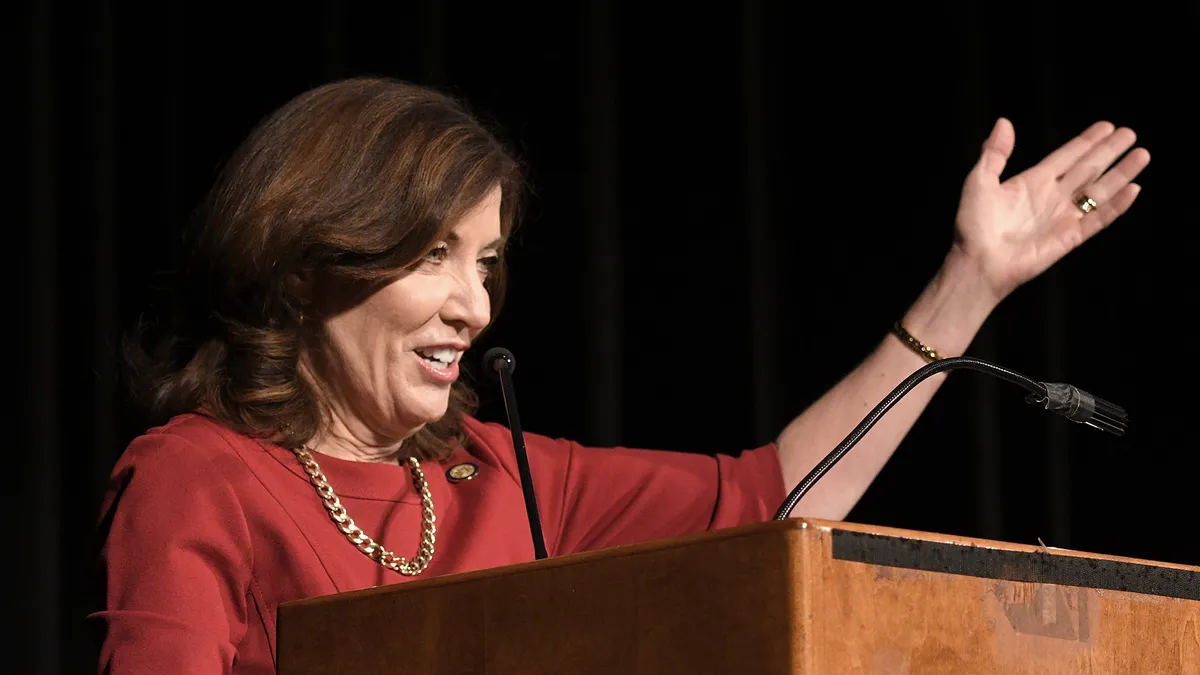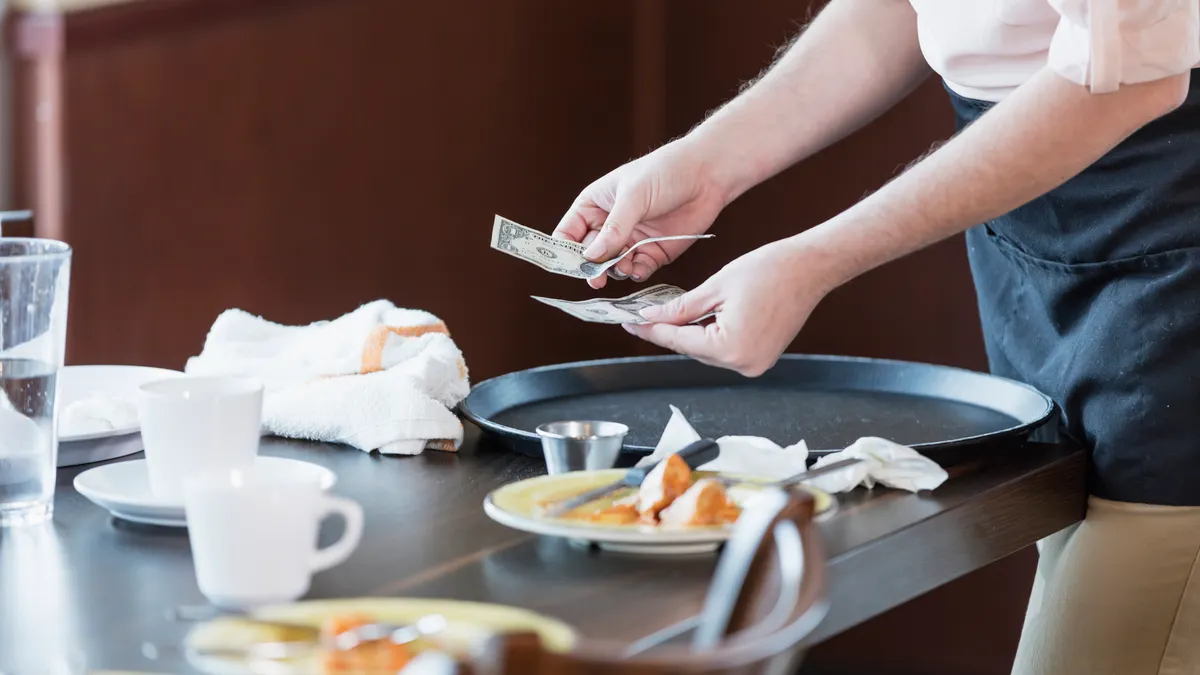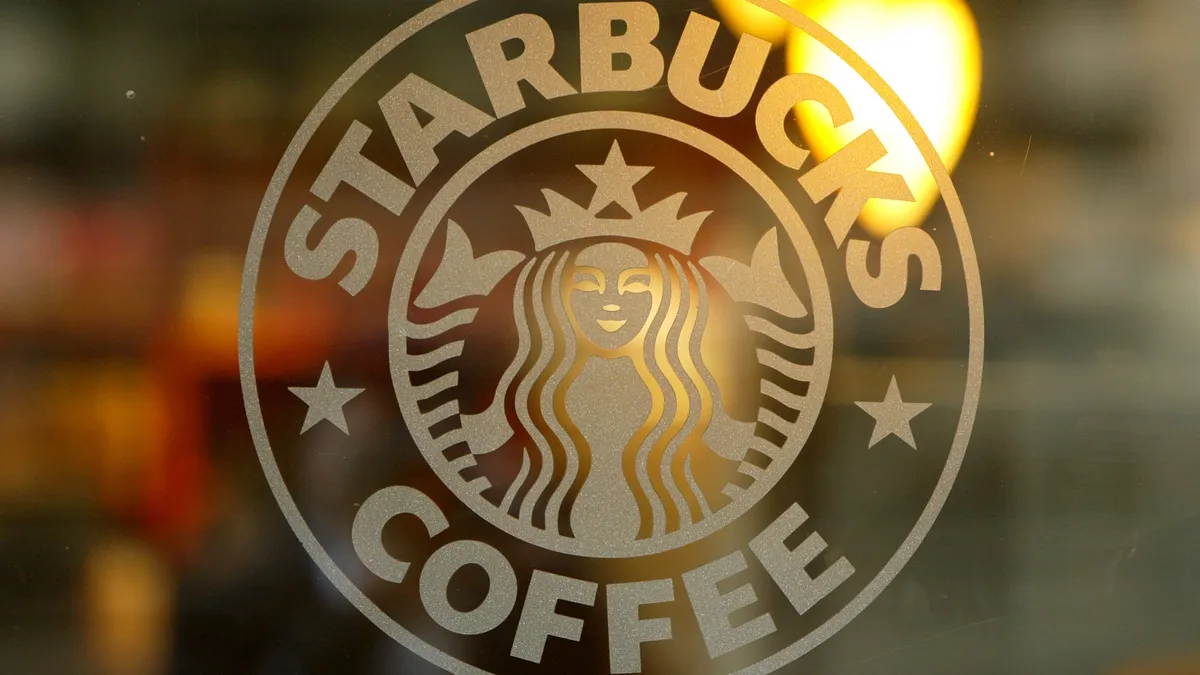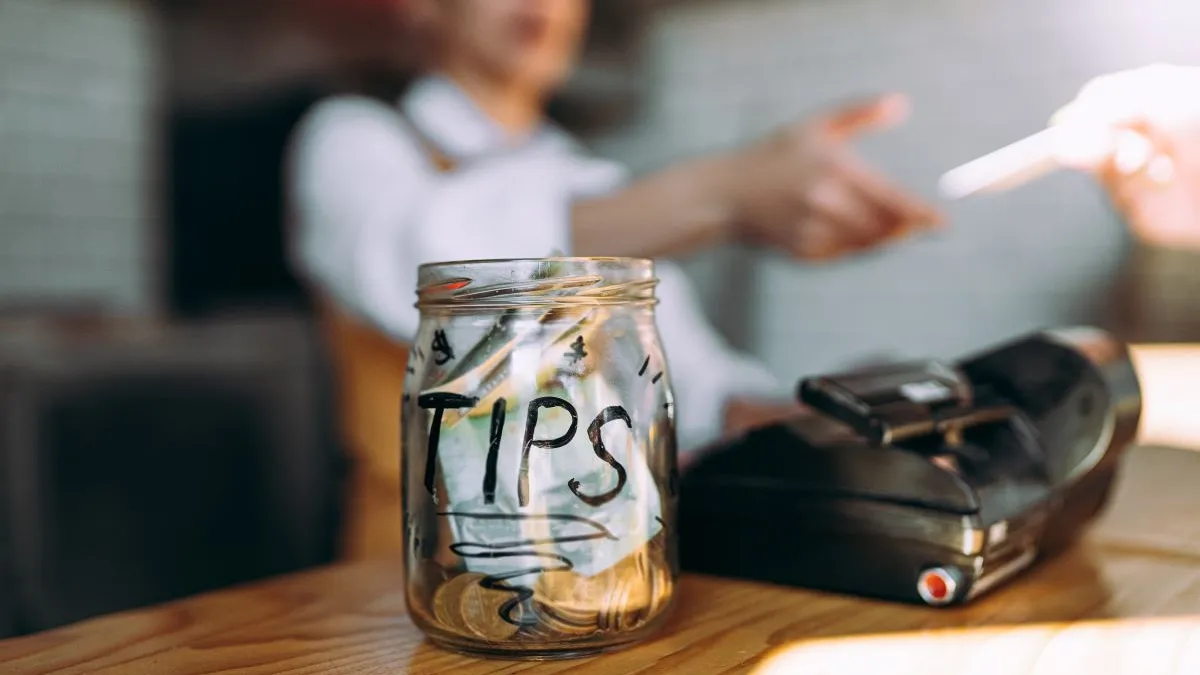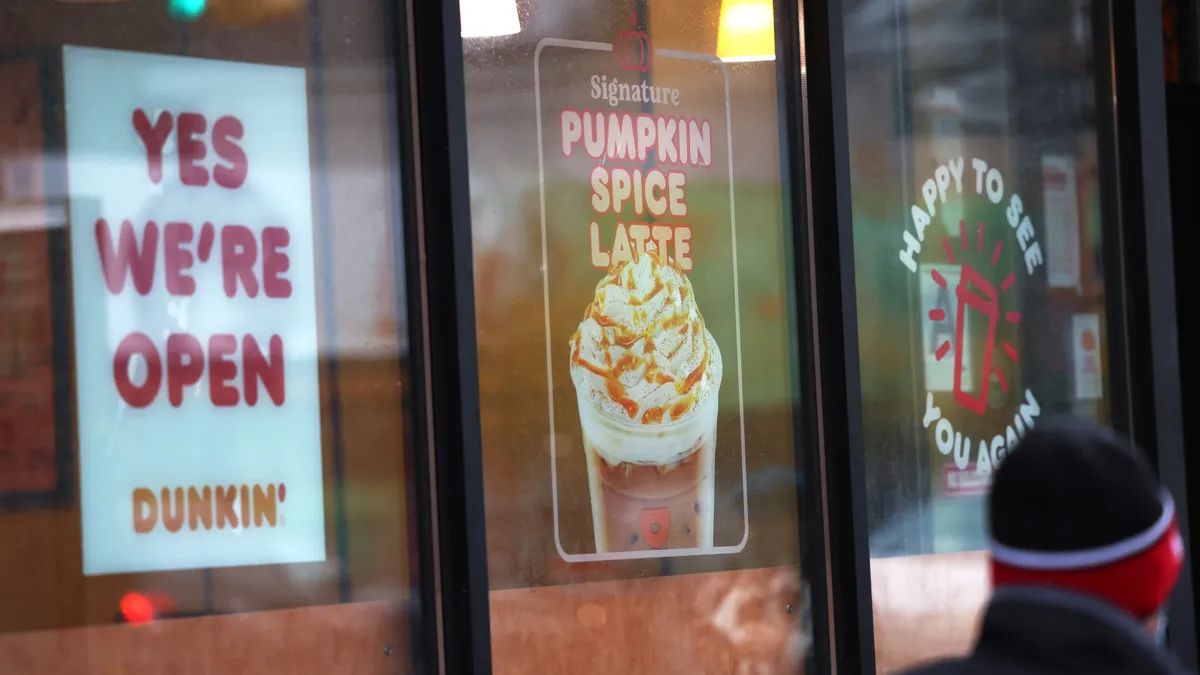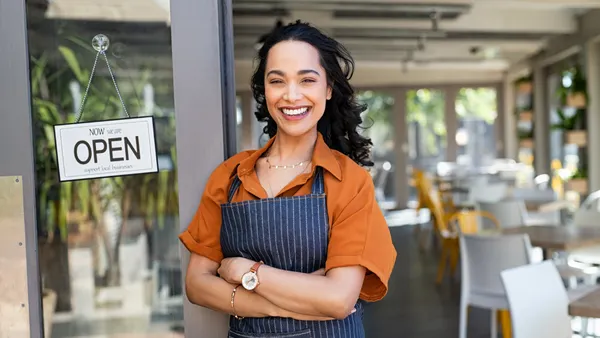A few months into the pandemic, New York Gov. Andrew Cuomo had become the face of aggressive COVID-19 policy. Though many Americans praised the governor's pandemic response, restaurants struggled under his preventative restrictions.
Now, after bombshell sexual harassment allegations, Cuomo will step down on Aug. 24, and New York restaurants will have a new governor shaping the state's restaurant pandemic policy: current Lt. Gov. Kathy Hochul.
"We're looking forward to working with Lt. Governor Hochul as she assumes the Governorship in the next few weeks," Andrew Rigie, executive director of the New York City Hospitality Alliance, said in an email. "The state's restaurant industry, particularly the restaurants and bars in the five boroughs, has been financially devastated over the last 18 months, and we'll look to build a meaningful and productive partnership between the industry and Lt. Governor Hochul that allows the city's more than 25,000 restaurants and bars to recover from this pandemic-induced economic crisis."
That recovery has been slow going as restaurants fight to make up for last year's losses. The Big Apple was especially impacted — between March and November 2020, New York City restaurants lost $10.3 billion in revenue, and at least 1,000 of these operators had closed as of January 2021.
But the whole state was rocked by Cuomo's indoor dining ban, which lasted from March 2020 to the end of September. By the time New York restaurants opened their dining rooms after that six-month period, many other states had already relaxed their restrictions since early summer and had begun to bounce back, putting the Empire State behind.
Hochul will take the helm two months after New York's state of emergency has ended, so she will not have the power to make statewide policy unless the New York State Legislature reinstates a state of emergency if the pandemic worsens, New York State Restaurant Association President and CEO Melissa Fleischut told Restaurant Dive.
But Hochul will still be a key player in the state's restaurant recovery, especially as the delta variant proliferates and New York City prepares to launch a vaccine passport program for indoor dining and other activities. Fleischut spoke to Restaurant Dive about the NYSRA's experiences working with Hochul, what challenges lie ahead for New York restaurants and how she hopes Hochul will approach COVID-19 guidance for restaurants.
This interview has been edited for brevity and clarity.
RESTAURANT DIVE: Do you think New York's approach to COVID-19 restaurant policies could change once Kathy Hochul becomes governor?
MELISSA FLEISCHUT: We have worked with her during the COVID-19 crisis. At one point the state of New York had the sort of regional areas that we were dealing with zone by zone and tracking COVID-19 levels. When we were going to reopen — this was back in probably late spring of 2020 — she had the western New York region so we had conversations with our members and the Lt. Gov. [Kathy Hochul]. We were doing a lot of conversations at that point about outdoor dining and how outdoor dining could be an important path forward for the restaurant industry because we knew at that point that it seemed like COVID-19 was spreading less outdoors, and there would be more consumer confidence for outdoor dining, so she seemed really supportive of that notion and was encouraging us to move forward with that as a proposal.
Do you think it's likely the rise of the delta variant could cause those emergency powers to be reinstated?
FLEISCHUT: I don't think we'll see restaurant lockdowns again. We'll have to see what happens with this new policy in New York City about vaccination mandates. But right now we're certainly seeing a lot of discussion about wearing masks, but we haven't seen any mask mandates. New York City is moving in this direction of a vaccine mandate, so I think it's kind of too early to tell, but I think that there's a lot of certainly concern about delta and trying to do the right thing, as far as public health is concerned, but I don't think that the state wants to see us take a step back to those restrictions, and the impact it had on not only our industry but also the entire state economy.
Could New York City's vaccine passport program help ensure dining room closures aren't deployed in the city again?
FLEISCHUT: We certainly hope that we don't head back to a restriction situation or anything like that, but there's still a number of concerns that have to be worked out with the New York City policy so that we can understand exactly how it's going to be implemented, both with our guests and our employees. The concern from a lot of the operators that we're hearing from is, how do I manage this when we already have a short staff and we have labor shortages that we're dealing with. And I have an employee who perhaps chooses not to get the vaccine because of a medical issue or a religious issue. We're kind of in between two essential legal issues that we have to resolve, and right now we don't even know exactly how this is going to roll out. And we still have a lot of questions that need to be answered.
How are you advising members who are curious if they should implement their own proof of vaccination rules?
FLEISCHUT: We've done a number of phone calls with both our members and operators across the state, and even some across the country, [about] what their concerns are and where they see potential problems with a proposal like this. And then we've compiled a list of concerns, questions, observations, things that we think could be a problem for the restaurant industry. And we've now shared that with a number of the city agencies — the City Council members, the mayor's office. We're trying to bring up some of these points and also to just express to them the concern that we're hearing from restaurants about not really knowing how to implement this, what kind of training our employees might have, what kind of enforcement is going to be behind this. Is there going to be some personal responsibility put on the guests to provide us with accurate information? There's lots of concerns about the passes themselves and the apps, and we understand all of that too, so there are just a lot of questions that need to be answered.
We're certainly looking for parity as well with other industries and the city itself. The city had originally said that [it was] going to allow for [its] employees to either be vaccinated or do weekly testing. So we're trying to understand is that an option for restaurant employees? Is that going to be something that we're allowed to do too? And if not, wouldn't it be right for the city to have the same rules as the hospitality industry? So those are some of the points that we're raising.
How does the association feel about how Cuomo implemented pandemic restaurant restrictions? How was his communication with the restaurant industry?
FLEISCHUT: I think we had a good line of communication with the governor's office and the decision makers when it came to what these policies and restrictions were going to be. I guess there was always a lot of concern as to ... the industry being made a focal point of COVID-19. And that seems to be a concern as we continue to move forward with the mayor's office as well that it seems to always come back to the restaurant industry when we think it should be [a broader] conversation and discussion than that. But we were able to work with them and get a number of things that were important to the industry throughout the process, like easing restrictions for outdoor dining. Our guidelines for our State Liquor Authority were eased so we could take advantage of outdoor space. We had a number of executive orders that were important to us like alcohol to-go for so long, so there were certainly things that worked well for the industry. You know, not everything worked great, and we certainly had restrictions on us probably longer, and especially in New York City, than a lot of other areas of the country so that was incredibly difficult for the industry.
With Hochul set to be instated as governor in a few weeks, what are your hopes for how she approaches restaurant policy during this challenging time?
FLEISCHUT: We'll have a lot of the same concerns that we have right now that still need to be addressed as to how are we going to focus on a broad [COVID-19] response that doesn't target the restaurant industry, and looking at this in terms of maintaining safety for our guests and our employees, but being able to understand that the industry can't shut down again. People won't be able to survive and that won't be good for anybody involved in the restaurant industry — the employee, the owner, the manager. We've been fighting to get alcohol to-go extended. It was something the governor supported but was only going through executive order, and the legislature didn't pass it. For all politicians, we would want them to understand the industry is not recovered from this, and that we still need a lot more help and please don't do any harm.



